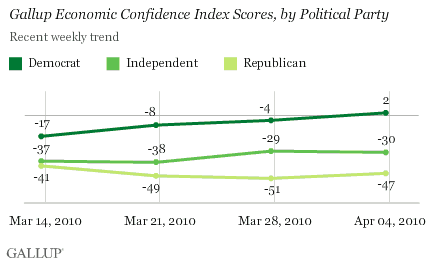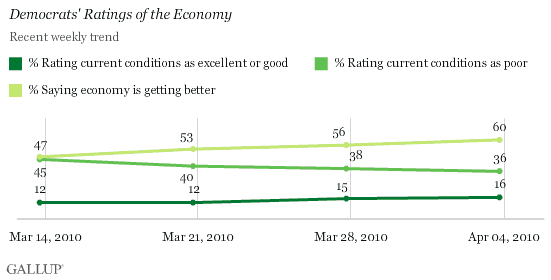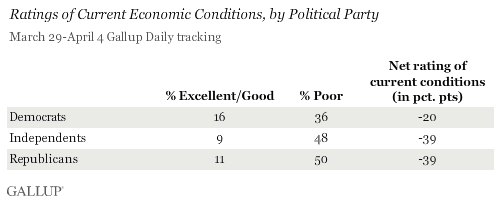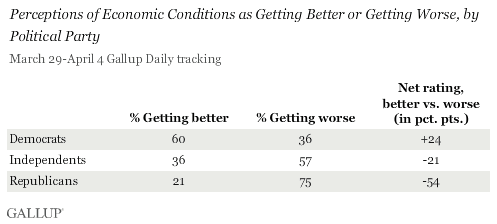PRINCETON, NJ -- Democrats are substantially more positive about the economy than are Republicans or independents, and have become more so in recent weeks, underscoring the large political component evident in how Americans view the economy.

The results are based on weekly averages from Gallup Daily tracking. Economic confidence among all Americans has improved from -32 to -24 over the last four weeks. The Economic Confidence Index summarizes Americans' ratings of current economic conditions (as excellent, good, only fair, or poor) and their perceptions of whether the economy is getting better or worse. Democrats' confidence is improving in both regards.
In the most recent week (March 29-April 4 interviewing), 60% of Democrats said the economy was "getting better," up from 47% four weeks ago. And the percentage of Democrats who rate current conditions as "poor" dropped from 45% to 36% over the same time, with a slight increase from 12% to 16% in "excellent" and "good" ratings of the economy.

Democrats are similar to Republicans and independents in having a net negative evaluation of current economic conditions, though Democrats' assessment is less negative than that of the other party groups.

Where the parties diverge, rather dramatically, is in their perceptions of whether the economy is improving. At this time, by 60% to 36%, Democrats say economic conditions are getting better. By 75% to 21%, Republicans say they are getting worse.

Implications
There clearly is a political component to how Americans view the economy, in particular in terms of their economic outlook. Democrats, whose party controls the White House and both Houses of Congress, are substantially more optimistic about the economy's direction than are Republicans or independents, and have become more so in recent weeks. Republicans, at odds with the president and the Democratic leadership in Congress, are much less likely to agree that the economy is moving in a positive direction.
The timing of the improvement in Democrats' views suggests that passage of the healthcare bill may have helped brighten their economic outlook more generally. In addition to healthcare, there are positive economic signs that could reinforce the view that the economy is improving, including recent increases in consumer spending and retail sales, and the government's March jobs report, which showed the largest job growth in nearly three years.
As is often the case, there are still indications that the economy is not improving, given that the unemployment rate remains high. Additionally, Gallup's Daily tracking of job creation in the U.S. does not yet show substantial improvement, and while self-reported consumer spending increased modestly last month, it is nowhere near as high as in 2008, before the major impact of the recession.
Such mixed signs allow political leanings to exert more influence on one's assessment of the economy than would be the case if all the data pointed in one direction.
Survey Methods
Results are based on telephone interviews with a random sample of 2,953 national adults, aged 18 and older, conducted March 29-April 3, 2010, as part of Gallup Daily tracking. For results based on the total sample of national adults, one can say with 95% confidence that the maximum margin of sampling error is ±2 percentage points.
For results based on the samples of 903 Democrats, 839 Republicans, and 1,069 independents, the maximum margin of sampling error is ±4 percentage points.
Interviews are conducted with respondents on land-line telephones and cellular phones.
In addition to sampling error, question wording and practical difficulties in conducting surveys can introduce error or bias into the findings of public opinion polls.
